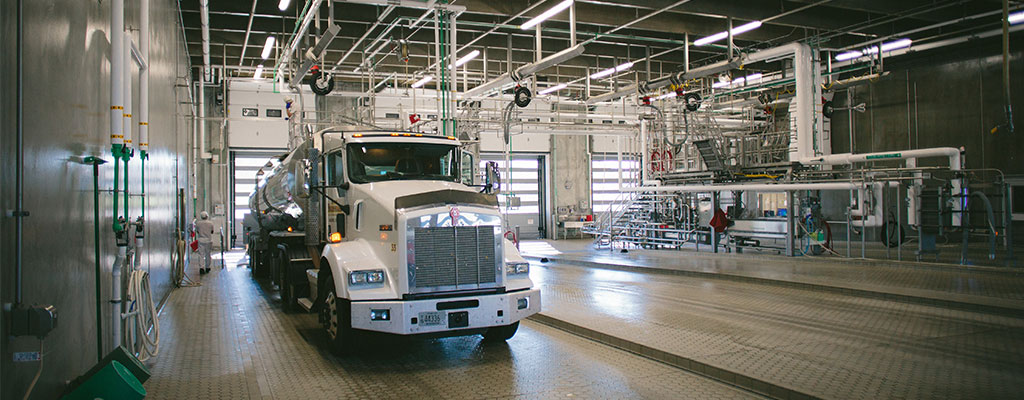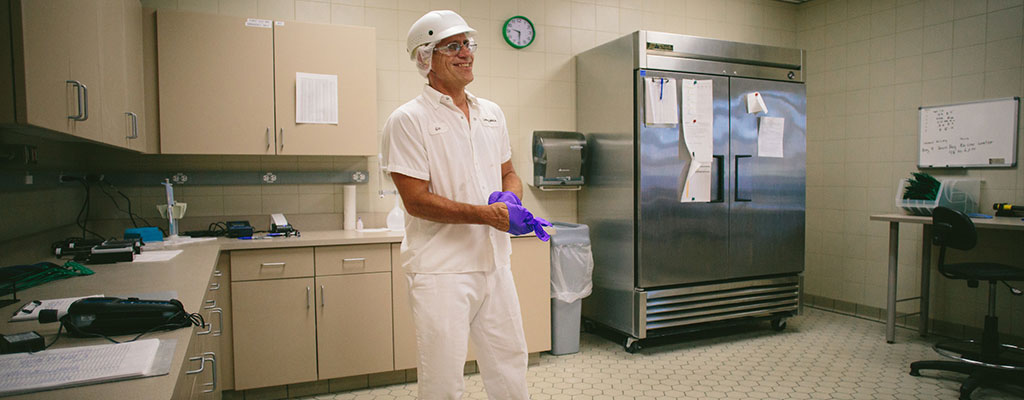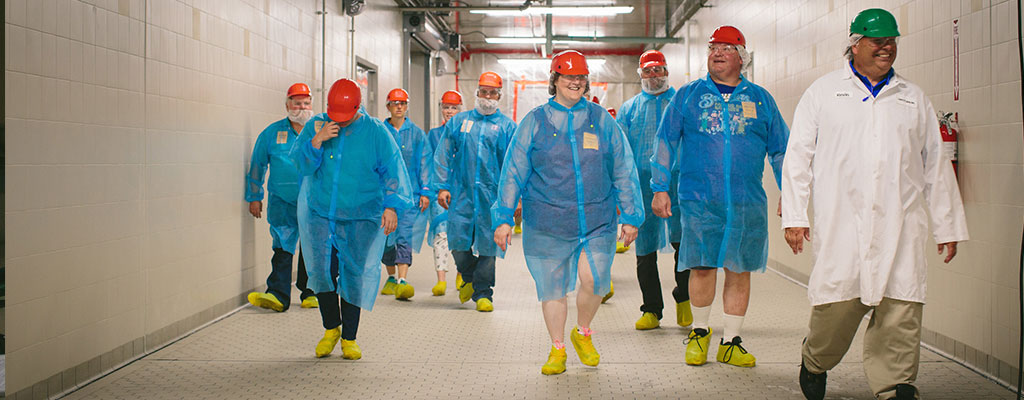Along the backroads, outside small towns across the country, there’s a common sight. Signs that read LAND O LAKES Dairy Owner. They’re a symbol of pride for the members-owners of Land O’Lakes, Inc.’s cooperative system, proudly displayed at farm gates and driveway entrances. In eastern Wisconsin, it’s hard to miss these signs the closer you get to Kiel—a small, but bustling town in the region.
That’s because nestled in the heart of America’s dairyland is the Kiel cheese plant, part of our Global Dairy Ingredients business. The milk that’s turned into Kiel’s award-winning cheese is provided almost exclusively by these nearby Land O’Lakes member-owned farms. And just recently, the team at Kiel has made room for a lot more milk as they near completion of a three-year modernization project.
With phase two of three wrapping up, in August, a group of dairy farmers were invited to take a look inside the Kiel facility to see exactly what happens to their high-quality milk when it leaves the farm and arrives at Kiel. But before we get to the tour, let’s take a look at exactly how the plant could now be considered one of the best in the United States–and how they’re making room for more milk in the future.
A seamless startup
If you’ve heard anything at all about the Kiel cheese plant, we’d be willing to bet it’s about their accolade-laden cheddar. That’s right—the Kiel team has solidified its place as one of the top cheese producers in the country with hundreds of awards under its belt. You can learn more about that here. To stay on top requires investment and this case, renovation.
The plant was built in 1948 and received facelifts in 1984 and 2000. But in 2013, construction crews broke ground on a major investment installing the latest cheese vat technology, along with a renovated milk receiving area and utilities. This included a new four-bay receiving dock and milk intake station, six milk silos, two new clean-in-place systems, a high temperature short time pasteurizer and eight 60K APT cheese vats, among other upgrades.

Imagine making award-winning cheddar while a part of your plant is in the middle of a major construction project. Making cheese is a tedious and scientific process. Measurements matter, the tiniest change could wreck a whole batch. You have to maintain your quality and food safety, and keep up with the farmers whose milk arrives at the plant rain or shine, each and every day.
In fact, the facility receives 2.2 million pounds of member milk each day that it uses to produce cheese of many varieties. You’d think taking in this much milk using brand new equipment would have to be a slow process. Surely it couldn’t happen overnight. And maybe there’d even be lost product. But in May 2016 when construction of phase two was complete, Kevin Schwartz, plant manager, and his team of 105 proved all of these assumptions wrong.
“We were eager to start-up but knew it had to be seamless to our customers, our suppliers (member-owners) and our industry,” says Kevin. “We did a staggered start-up so we didn’t have to divert much milk or take any down days to do it. Through the entire transition, we kept producing cheese with our known recipes.”
With the staggered startup, Kevin’s team used the old and new equipment intermittently as they received milk from members. And they were prepared. For months leading up to the startup, the team became well-versed in the new equipment after a number of safety walk-throughs, dry tests, water tests and GMP (good manufacturing practices) implementation along with countless hours of training and tours. This helped the team focus on one piece of the changeover at a time.
“Everyone was so dedicated and conscientious,” says Kevin. “Striving to make the best cheese out there is always top of mind. Without that mindset and this team, we would’ve never had such a successful startup.”
It all starts with intake
Fast forward to August, and the Kiel team had been reaping the benefits of the upgrades for a few months. One of the most improved areas of the plant was the receiving dock and milk intake station—the place where the cheese-making process starts.
Gene Casper, intake coordinator, has worked at the Kiel plant for 30 years. His job is to begin the intake process. First, the milk truck is washed to remove any dirt, dust and grime that could contaminate the space. Then, he tests a sample of milk to ensure it meets quality and food safety standards. Once the sample is approved, the milk can be unloaded.
Before the renovation, the receiving dock’s layout couldn’t easily support the sometimes six trucks trying to unload at once. And when you need to accommodate more than 46 trucks per day, that’s a big deal.

With the renovation, receiving lanes are streamlined and a new-and-improved waiting area accommodates truckers. And, morale is way, way up.
“We’re all very happy to be in here. Gene says. “This improvement is the best I’m ever going to see for my entire life…I still can’t believe it.”
Though the receiving dock and milk intake station is where the upgrade began, the positive sentiment is felt across the entire plant since every upgrade was customized to the plant and was made with efficiency in mind. Teams came together from across our enterprise—supply chain, quality, member relations, information technology and many more—to analyze the state-of-the-art technology. Food safety, employee safety and sustainability considerations were needed throughout the duration of the project. And the work paid off.
“I’ve heard from regulatory officials about how well laid out the space is. In fact, when we had them out for a tour, they said it was one of the nicest, most well-thought out projects they’d seen.” says Kevin.
A point of pride
Kevin credits Kiel’s success to the Land O’Lakes member-owners’ commitment to quality. Because good, high-quality milk is the start of the cheese making process, without it, you wouldn’t have award-winning cheese. Approximately 85 member-owners supply the milk for Kiel’s cheese, many living within 15-20 miles of the plant.
Nic Schoenberger of Greendale Dairy has been shipping milk to Kiel since he and his wife, Christine and her brother, Mike Schuler acquired the business in 2004. The farm itself has been shipping to the plant since it was open when Mike & Christine’s grandfather ran the business.
Today Greendale Dairy has 630 cows on farm and ships 53,500 pounds of milk to Kiel every day. Nic had never stepped inside the place where the milk from his dairy is delivered until this past August when he and a group of Wisconsin member-owners were invited to see what the investment was all about.

“It was a huge deal to see what we were investing in. It’s good to know the company is making investments…which shows that there’s a lot of growth in the works,” says Nic.
Beyond the upgrades themselves, he was most impressed with Kevin and his passion for what his team does at Kiel.
“It’s nice knowing we’ve got a sought-out product. They manufacture something that’s really special to a lot of folks,” says Nick. “Afterward I came away with a great sense of pride. They’re looking out and looking toward the future and get so excited about what they do. It really was one of those moments you were proud to be a member.”
A look to the future
When dairy markets are unpredictable—and these days, often unsettling—a concern that’s undoubtedly near the top of dairy producers’ lists is: will there be somewhere to deliver my milk? With the Kiel expansion, Land O’Lakes is showing confidence by answering yes to that question.
Phase three of the Kiel modernization project will focus on the whey processing area of the plant. Estimates show capacity could increase intake by more than a million pounds. And with this expanded capacity, Kiel could increase their cheese supply for customers by 700,000 pounds a week.
"We’ll be able to look into diversifying the types of cheeses and even the package configurations we produce here,” says Kevin. “We’ll have a broader range of the premium cheeses we produce at Kiel. And importantly beyond that, we’ll be making a home for more milk from eastern Wisconsin in the future."